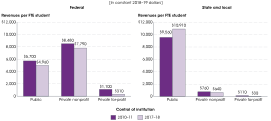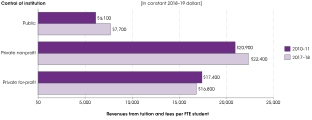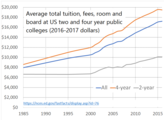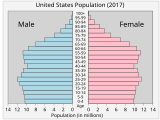Quizbank/Cost-benefit analysis/Data
Appearance
Images
[edit | edit source]Click the caption to see a large version of the image.
- Student debt shown in red is currently $1.5 trillion. It is second only to home mortgages, and the fastest growing household debt shown in the figure.
- Government subsidies per full-time student should also be considered in calculating the cost of higher education (shown for the academic year 2017-18.)
- Tuition & fees shows the tuition and fees used to estimate the annual revenue a full-time student brings to a college or university.[1]
- Tuition, fees, room & board shows the annual total cost to attend college full time.
- Demographics can be used to estimate what fraction of the population is in a likely age bracket to attend college. Approximately 22 million people of in the US occupy the 5-year (20-24) age group. Take 30% of that number and we conclude that at least 6.6 million students are currently paying for an education. This is reasonably close to the estimate of 10 million full-time students used for our calculation.
- Graduation rates are shown for completing a degree within 4 or 6 years.
- Not available on Wikiversity is the image w:File:Educational_Attainment_in_the_United_States_2009.png. It suggests that about one third of adult in the US hold college degrees.[2]
Tables
[edit | edit source]This table estimates the total enrollment in US colleges to be about 20 million students.[3]
| Year | Fall enrollment | Degree-granting institutions | |||
|---|---|---|---|---|---|
| (all postsecondary) | (degree-granting) | (total) | (4-year) | (2-year) | |
| 2010-11 | 21,591,742 | 21,019,438 | 4,599 | 2,870 | 1,729 |
| 2011-12 | 21,573,798 | 21,010,590 | 4,706 | 2,968 | 1,738 |
| 2012-13 | 21,148,181 | 20,644,478 | 4,726 | 3,026 | 1,700 |
| 2013-14 | 20,848,050 | 20,376,677 | 4,724 | 3,039 | 1,685 |
| 2014-15 | 20,664,180 | 20,209,092 | 4,627 | 3,011 | 1,616 |
| 2015-16 | 20,400,164 | 19,988,204 | 4,583 | 3,004 | 1,579 |
| 2016-17 | 20,224,069 | 19,841,014 | 4,360 | 2,832 | 1,528 |
A look at the revenues from local, state and federal governments, as well as from students gives us a rough idea of what it costs to educate a full-time college student for one year during the 2017-18 academic year.[4] But as discussed elsewhere, this estimate is not likely to accurately represent actual cost of teaching any given course.
| Public | Private nonprofit | Private for-profit | |||||
|---|---|---|---|---|---|---|---|
| $15,870 | Fed State & Local | $8,430 | Fed State & Local | $340 | Fed State & Local | ||
| $7,700 | Tuition and Fees | $22,400 | Tuition and Fees | $16,800 | Tuition and Fees | ||
| Combine tuition & fees, as well as local, state, and federal funding (2017-18 academic year) | |||||||
| $23,570 | Public | $30,830 | Private nonprofit | $17,140 | Private for-profit | ||
References & Footnotes
[edit | edit source]- https://bigfuture.collegeboard.org/pay-for-college/college-costs/college-costs-faqs
- Decreasing graduation completion rates in the United States (Wikipedia)
- ↑ https://nces.ed.gov/fastfacts/display.asp?id=76 nces.ed.gov nces.ed.gov/fastfacts/display.asp
- ↑ https://www.census.gov/prod/2012pubs/p20-566.pdf
- ↑ nces.ed.gov and w:Special:Permalink/926514015#Statistics
- ↑ https://nces.ed.gov/programs/coe/indicator_cud.asp





